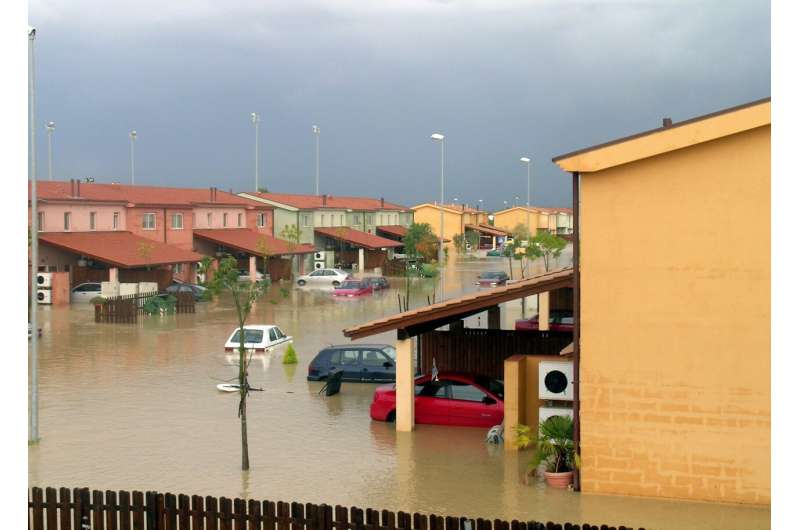To insure or self-insure? The question homeowners must answer amid impact of climate change

No matter where you live, there's a good chance the weather's getting wilder. In just the past few weeks, tornadoes have wreaked havoc on and , and large swaths of southern Florida . Globally, 2023 was .
In addition to harming life and property, weather-related catastrophes have caused the cost of homeowners insurance to spike. Premiums have risen at rates .
In places such as Florida that are particularly exposed to natural disasters, homeowners insurance isn't just expensive—it's increasingly becoming difficult to find. That has caused some homeowners to .
don't have homeowners insurance, according to a recent analysis from the Consumer Federation of America. That's about one out of every 14 homeowners in the country. Collectively, they have at least US$1.6 trillion in unprotected market value. That's a lot of risk.
As a and an expert in actuarial science, which deals in assessing risks, I've watched the mounting homeowners insurance crisis closely.
If catastrophic weather events continue to escalate, so-called "self-insurance"—buying no insurance and paying for any losses yourself—might be the only viable option for homeowners living in disaster-prone areas.
Why risk is getting more expensive
In general, the price of risk, as reflected by an insurance premium, is a function of the risk's potential frequency and its severity. Potential frequency means the likelihood of a loss occurring, and severity means the financial cost associated with the loss.
So, increases in the frequency or severity of risks result in higher homeowners insurance premiums. The biggest catastrophic risks affecting homeowners insurance include hurricanes, tornadoes, floods, wildfires and winter storms.
Given climate change, it's likely that many of these catastrophes will become stronger and more common, leading to higher insurance costs. In fact, —although how much insurance companies are pricing in the cost of climate change, and whether it's enough, is uncertain.
If you do opt to buy homeowners insurance, as more than 92% of American homeowners do, you should comparison shop for the best price and coverage. You can do this independently or through an agent or broker.
They may not differ much in their premium prices, however, given the emerging risks. And some insurers may be unwilling to write new policies, depending on where you live. For example, and have paused their writing of new homeowners insurance policies in some disaster-prone markets in California.
Choosing to self-insure
Instead of buying homeowners insurance, you may choose to self-insure. Finance experts consider self-insurance to be a legitimate risk management strategy. But that's only if you choose it with full knowledge of the risk exposure and financial consequences.
Self-insurance is a common component of large organizations' overall risk strategy. For example, as many as 33% of privately employed workers nationwide are insured by employer-sponsored, . For many organizations, self-insurance is .
For those homeowners wealthy enough to absorb a major uninsured loss, it makes sense to consider self-insurance.
Of course, there are some caveats.
First, homeowners need to be realistic about their ability to respond to a significant uninsured loss. Having a thorough knowledge of your personal financial situation—or access to a qualified financial planner—is critical.
Second, self-insurance is likely to be viable only for homeowners who own their homes outright. If there is a mortgage on the property, purchase of an insurance policy is typically required to protect the lender.
And finally, it's important to remember that homeowners insurance is a "multi-peril" policy, which includes liability coverage for accidents. While the size of a property loss might be limited to the value of that property, liability risk is potentially unlimited.
Without homeowners insurance, potential liability exposure should be addressed in some other way—for example, through risk-control efforts such as warning signs or limiting guests on the property, or through some type of stand-alone personal liability insurance policy.
How long will the insurance crunch last?
Most insurers try to maintain stable rates and premiums. But historically, most property-liability insurance has followed a multiyear underwriting cycle. This cycle, from the standpoint of the insurer, goes from a high-premium/low-loss ratio to a low-premium/high-loss ratio, and back again.
, including price competition within the insurance industry and uncertainty associated with future losses. The result is that when it comes to homeowners insurance, affordability and availability problems are often just temporary. Ultimately, supply and demand adjust, with a new market equilibrium arising as a natural part of the cycle.
Whether this will be the case for current issues in homeowners insurance depends on a number of challenges facing homeowners. There's some reason for pessimism: Mortgage rates have recently hit their highest levels in , and in the meantime, prices in many areas have skyrocketed.
Meanwhile, in 2023, the reached its lowest level in almost 40 years. And the future impact of climate change on homeowners insurance losses remains uncertain at best.
Amid all this uncertainty, one thing is clear: Being, or aspiring to be, a homeowner is a real challenge these days.
Provided by The Conversation
This article is republished from under a Creative Commons license. Read the .![]()




















